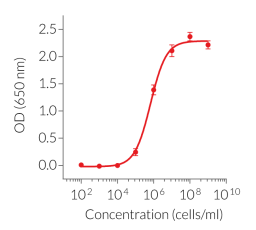HKSA
-
Cat.code:
tlrl-hksa
- Documents
ABOUT
Heat Killed Staphylococcus aureus
HKSA is a lyophilized heat-killed preparation of Staphylococcus aureus, a Gram-positive extra-cellular growing bacterium. HKSA is recognized mainly by TLR2.
HKSA induces tolerance to a secondary HKSA stimulation but causes priming to LPS, suggesting a differential regulation of cytokines and chemokines in Gram-positive- and Gram-negative-induced inflammatory events.
All InvivoGen products are for internal research use only, and not for human or veterinary use.
SPECIFICATIONS
Specifications
106-108 cells/ml
Insoluble (resuspended HKSA results in a cloudy suspension)
TLR2 activation in cellular assays
Each lot is functionally tested and validated.
CONTENTS
Contents
-
Product:HKSA
-
Cat code:tlrl-hksa
-
Quantity:10^10 cells
1.5 ml sterile endotoxin-free water
Shipping & Storage
- Shipping method: Room temperature
- 4°C
Storage:
Details
HKSA is a lyophilized heat-killed preparation of Staphylococcus aureus. S. aureus, a Gram-positive extra-cellular growing bacterium, is a major source of mortality in medical facilities. It causes a wide range of infections from skin infection to life-threatening diseases. HKSA is recognized by TLR2, but also other TLR family members except for TLR4 [1]. It induces the production of TNF-α and IL-6 in macrophages through a MyD88-dependent signaling pathway [1,2]. HKSA induces tolerance to a secondary HKSA stimulation but causes priming to LPS, suggesting a differential regulation of cytokines and chemokines in gram-positive- and gram-negative-induced inflammatory events [3].
1. Takeuchi O. et al., 2000. Cutting edge: TLR2-deficient and MyD88-deficient mice are highly susceptible to Staphylococcus aureus infection. J. Immunol. 165:5392-5396.
2. Lembo A. et al., Differential contribution of Toll-like receptors 4 and 2 to the cytokine response to Salmonella enterica serovar Typhimurium and Staphylococcus aureus in mice. Infect Immun. 71(10):6058-62.
3. Peck OM. et al., 2004. Differential regulation of cytokine and chemokine production in lipopolysaccharide-induced tolerance and priming.Cytokine. 26(5):202-8.
DOCUMENTS
Documents
Technical Data Sheet
Safety Data Sheet
Certificate of analysis
Need a CoA ?



